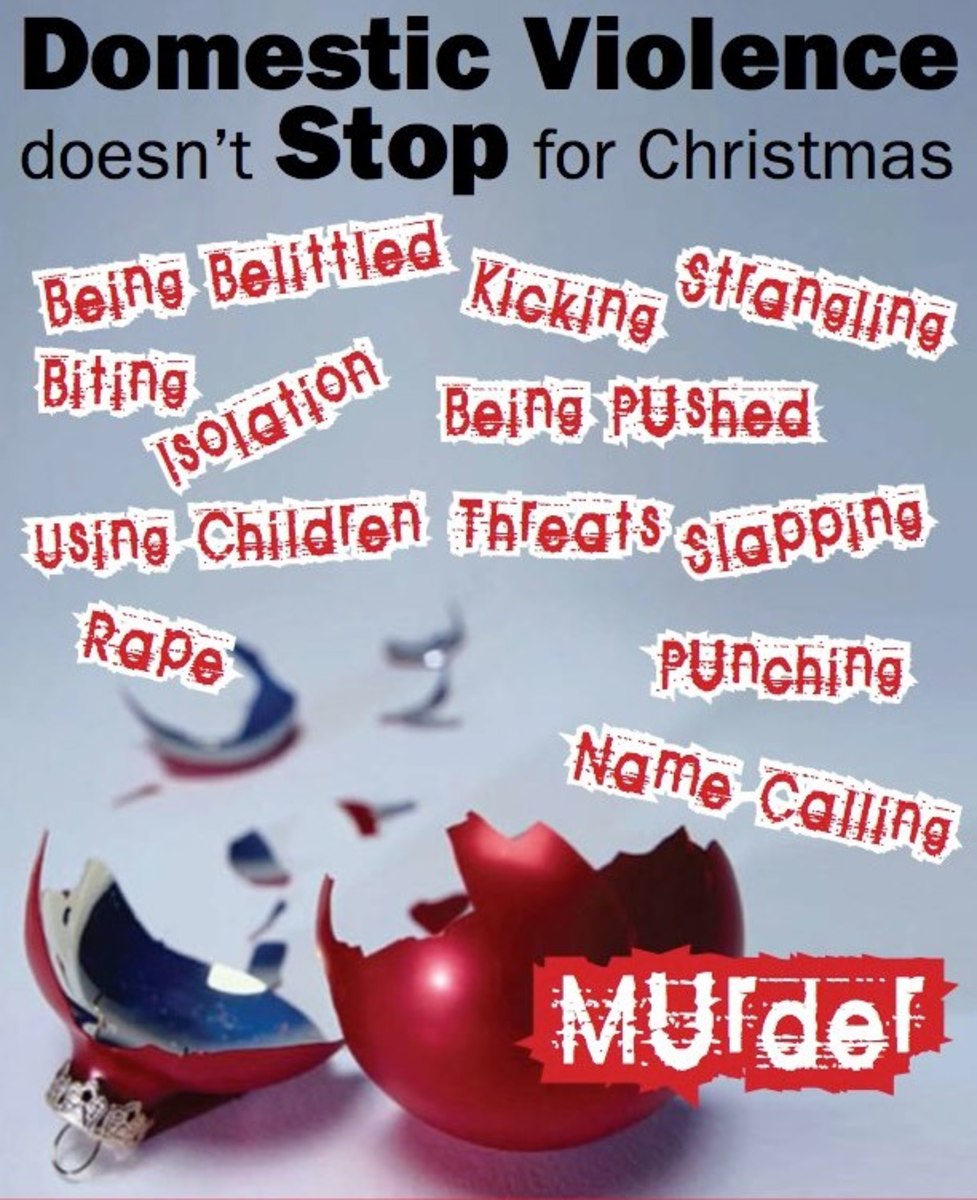Abusive Relationships | Why Change is So Difficult

Solving Relationship Problems
Abusive relationships don't always result in black eyes and broken bones. Emotional scars can last a lifetime and be the result of words or silent treatments. Often, people wonder why a man or woman stays in a relationship when their partner clearly doesn't treat them in a loving and respectful manner.
I've been abused. I've been the abuser. The journey to finding the kind of love I'd only ever dreamed about took me decades to navigate. I attended anger management courses with the guy who ripped my clothes off me in public. I pleaded with my first husband to attend couples counseling with me and when he refused, I went by myself, only to stop when the counselor suggested I was "working too hard" on the relationship. I felt terrible when I lashed out at another person, striking him over and over until we both were bleeding.
When we're in an abusive relationship, one question plagues us:
Why won't my partner change?
In this article, I'll discuss the answer to that question. You may not like what you read. I'm more direct and blunt than many counselors who need you to keep coming back in order for them to get paid. However, if you pay careful attention and put this information to good use, you won't regret it.

- Psychological Abuse and Controlling Men
When we think of domestic violence, we inevitably think of the physical aspect of this. There is a much quieter and less acknowledged form of abuse that can be just as destructive and traumatic. Is your partner playing mind games with you? - Signs and Symptoms of Emotional Abuse
Domestic violence often starts with emotional abuse or verbal violence. This article explains how abusive tendencies develop and what can help break the cycle. - Best Ways to Respond to Silent Treatment in Relation...
The silent treatment is a form of emotional abuse, but most advice on the topic is bad advice. Learn how to STOP tolerating the cold shoulder.
Quiz Yourself - Domestic Violence
view quiz statisticsSigns of Abusive Relationships
You may be wondering if your relationship is actually abusive. Most of the time, there's love and laughter, and everyone has a bad day occasionally, right? Besides, we know relationships are supposed to be hard work!
The purpose of this article is to discuss why change is so tough, so if you're not sure yet if you're in an abusive situation, take a look at the article links shown here for in-depth information on signs and symptoms of emotional and physical abuse.
In every relationship, including healthy ones, there is a power dynamic. Although there have been many labels used to classify relationship stages, the basic stages are:
- Attraction Stage - Romantic, idealized stage where everything looks fabulous
- Exclusivity - When a couple pledges to see only each other and to "be a couple."
- Uncertainty - Doubts arise about whether this relationship is worthy. Partners may ask themselves if this is the right person for them, if they have time for the relationship, if they'll have to give up too much of their individuality.
- Power struggle - Each partner must find a balance in how much individuality they give up for the relationship. While fledgling relationships may break up during the uncertainty stage, long-term relationships are at risk during this stage. Lucky couples hardly notice this stage, but for the majority of relationships, it may feel like your partner has turned into someone you hardly even know!
- Consciousness - The power struggle is over. Both parties have decided to fully commit to the relationship with a clear view of their incompatibilities and a willingness to accept those differences without complaint or criticism. (Or at least, not to let complaint and criticism become intense enough to harm the relationship.)
When abuse enters a couple's relationship, it's normally seen in the power struggle stage, but it likely started earlier, during the exclusivity period. During exclusivity, a couple's boundaries begin to emerge, which sets the stage for the power struggle to come. If those boundaries aren't firm, it leads to major problems for a couple:
- Lax boundaries lead to enmeshment, where partners silently accept responsibility for things they cannot control, like the other person's happiness or rescuing them from irresponsible behaviors.
- Movable boundaries, when something that's ok today isn't ok tomorrow, create resentments and feelings of inadequacy.
- Rigid, inflexible boundaries drive a wedge between partners. One partner is expected to accept without question and feels invalidated and unimportant.
There is rarely an abuser and a victim when domestic violence exists.
When looking at the "big picture," there are two abusers and two victims in nearly 100% of relationships where domestic violence takes place. Attitudes, sarcasm, silent treatments, and cruel words can produce as much damage as physical attacks.
When boundary problems exist, a couple tries to navigate the power struggle stage on an unlevel playing field. Can you imagine if you were trying to play a game of football with a variety of mountains and molehills out on the field? You'd try passing the ball, but you can't see the receiver behind that big hill, and you wouldn't have any idea he'd tripped and fallen on something.
So each person does their best to level the field using any tactics they can think of. At first, they may try to make a simple request. When that fails, they may escalate their attempt by demanding. If there's still no real progress, they may shout, resort to silent treatments, or turn physical. They're trying to establish their influence on the relationship.
You may be thinking, "But he has plenty of influence! I do everything he wants. I take care of him constantly!" (I'll use "he" for convenience, since I'm a woman and these are things I have said and felt, but it could just as easily be "she" in every example I'll be using.) When you say this, you're remembering all the changes you've made and nice things you've done, and wondering why he just can't see it.
Will you be sad to learn that he does see it, and it doesn't make one iota of difference?
From A Reformed Abuser
A gentleman who calls himself MrK is an online acquaintance who openly acknowledges that he was abusive toward his wife. He's a valuable voice when men and woman come into the Talk About Marriage online forum asking about their own relationship problems.
While many people on the forum may say, "You're being abused" or "You're being abusive," his is the one voice that describes the abuser's perceptions, and he does it very effectively. Recently, when a woman posted about relationship issues she was having, many people replied to her thread with the same response, "You should leave him."
And like most of us have done, she said, "But he's my best friend."
Here's what MrK told her:
Here's where the disconnect happens. He is your best friend 99% of the time. He knows that, you know that. He sees his outbursts as bad, but he doesn't know HOW bad. He doesn't know what it does to you. What he sees as an aberration to an otherwise perfect marriage leaves you living in fear that 99% of the time he's "good". So 100% of your marriage is "off" for you. For him it's 1% (or less even). For him it's a minor "bad" but it's driving you away. He has NO IDEA that is happening. And DO NOT tell me "but I've told him 100 times in counseling". Talking doesn't work. You need to DO!!
This is exactly what happens where a power imbalance exists!
The person in power has it pretty good, and they cannot even perceive the low-power partner's reality. They hear it. They know it's not good, but their experience of the relationship is entirely different.
Notice his last statement? "You need to DO!!" This sums it up.
MrK's wife argued with him for years, cajoled, tried to get him to see things from her perspective. It never worked. She finally gave up, packed her bags, and called it quits.
He describes how that affected him:
When I found out my wife had checked out of our marriage YEARS prior, she was never coming back, and it was MY FAULT?!?!?! My life, my love, my soul mate didn't love me anymore and wasn't going to ever again?
I changed ON THE SPOT! Didn't even have to try. My DNA changed. NO WAY was I going to be that person that could do something like that to someone I love.
Right now, you may be feeling disappointed and wondering if leaving is your only option. The truth is, for some relationships, there will never be a recovery. But not all relationships are bound to end in separation. The key words are exactly what MrK says: You need to DO.
How Thoughts Turn Into Domestic Violence
The video below features a man reliving an instance of how an innocent situation turned into an abusive one. As you watch it, you may notice that what I call the escalating abuser has an extreme need for control, and that when emotions are high, logic shuts off.
How Thought Processes Turn Into Abuse

Stop Allowing Abuse
When I write an article like this one, it's important for me to do some research that lets people like you find what I've written. I do research on keywords that tells me how many people search for phrases related to the topic. I was sad to learn that there were 120 searches related to stopping domestic or relationship abuse, compared with a little over 500 people each month searching for tips on stopping child abuse, and 770 on stopping animal abuse!
Perhaps that's because the most common advice is so repetitive. "Just leave."
Of course, it isn't that easy. We love our partners and we try to focus on that 99% good MrK described. We don't want to say goodbye to the laughter, that amazing feeling that we are the only one who really rocks their world, and the other benefits of a relationship.
But it's true that change doesn't happen very often. We need to convince ourselves that we've tried everything. So we typically first try to seek out marriage counseling, which has a dismally low rate of saving marriages, despite participants reporting benefits from the process. A scholarly meta-analysis conducted at the University of Texas reveals that many counseling techniques produce some areas of success for individuals who engage in marital therapy, yet about 38% of those relationships still end in divorce.
Hopefully, you can address the problems in your relationship before you're ready to walk away, but you have to recognize a few important factors:
1. Talking will not lead to change.
2. Change will not happen without a crisis.
3. No matter how unhappy you may be, you are accepting the bad behavior if your partner isn't experiencing consequences that force your partner to deeply believe that they cannot allow a single instance of bad behavior to ever happen again.
Imagine for a moment that you were told that two years from now, you'll inherit a million dollars from Manny Moron. How will you treat him? Will you be more likely or less likely to show them your irritation when they say something you disagree with? Will you be more likely or less likely to do extra nice things for them? Will you do things he asks you to or tell him to take a hike? I'm no expert at creating charts, but our behaviors are directly influenced by how important a relationship is to us.
How to Fix a Relationship
Change isn't easy or pleasant. You have to decide whether it's worth it. If your relationship involves physical abuse, it can even be dangerous or deadly. (If you have experienced physical abuse that has ever landed you in a doctor's office or hospital, I don't encourage trying these steps at all and instead, would ask you to look into finding a domestic violence shelter where you can escape the relationship altogether because these suggestions will not work for a relationship where violence has progressed that far!)
Relationship abuse starts with boundary problems, which I've already described. Recovering it can be complicated because there are always two abusers and two victims. Yes, if you are being abused, you are also abusing your partner. One partner may be resorting to hitting and kicking, but the partner who uses sarcasm and silent treatments is doing just as much damage. People abuse because they feel powerless, and when abuse happens, it's because two people are trying to establish some measure of control.
So to recover, the basic steps you'll need to take are:
1. Figure out what you have control over.
You Control:
| You CANNOT Control:
| |
|---|---|---|
FEELINGS
| Your own
| Your partner's
|
ACTIONS / BEHAVIORS
| Your own
| Your partner's
|
BELIEFS
| Your own
| Your partner's
|
PRIORITIES
| Your own
| Your partner's
|
VALUES
| Your own
| Your partner's
|

It's the simplest chart in the world, but amazingly difficult to remember sometimes!
2. Set up your boundaries with these principles in mind. Visit my article on setting boundaries for detailed help.
3. Establish clear consequences that make it clear that you mean business. Do not defend or change your consequences. Get it in your own mind that they are simply the way things are.
4. Make sure your consequences are about taking care of you, not trying to manipulate your partner.
5. Enforce them.
6. Think positive when asking for change. This article discusses important scientific findings about how to encourage others to make changes.
Above All, Change Yourself to Change Your Relationship
One of my favorite truisms is "You can't change your partner, but you can change what you do, and if you change that, your relationship will change."
If you're serious about building a better relationship, you have to change your DNA, too, as MrK described. Consider your own role and how the things you do might contribute to your partner's feelings of helplessness. Recognize that you may not know how much your behaviors hurt your partner, too, and make a decision to make your relationship more important than the petty things that cause arguments.
Simply refuse to allow criticism and blame to be a part of your vocabulary! When you're unhappy, own your feelings. Do not expect your partner to fix YOUR unhappiness! Ask yourself how you can fix it yourself, without your partner's help, before trying to talk. Only broach the topics that cause disagreement after you know how you can fix it all by yourself, and then, if your other half doesn't want to contribute to a solution, you still won't feel powerless, so you won't need to fight to have your needs met. You can be more accepting and loving, without surrendering your values.
If you haven't had that "Oh, no!" crisis that lets you suddenly see clearly how to do this stuff, it'll take practice - and mistakes - to get there. But it is possible. And oh, so, worth it!
Best wishes to you on your journey. Stay safe. Stay happy.









